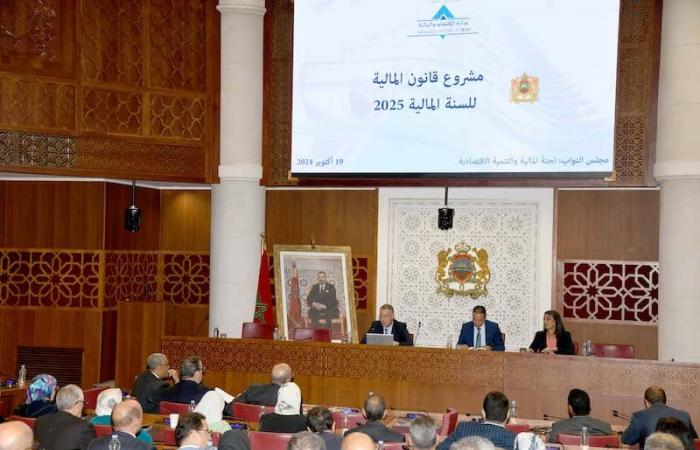Like its predecessors within the current legislative mandate, it appears that the draft finance law for the year 2025, which was recently presented in the second chamber of the Moroccan Parliament, does not enjoy widespread satisfaction from the opposition parties, which see it as “stray” from responding to the stakes that Morocco is raising during the period. The current situation, especially overcoming the water crisis, establishing the royal workshops of the social state, in addition to fighting the “encroachment” of corruption.
While the government majority praises that the law is based on “realism, credibility and ambition,” factions of the opposition argue that the assumptions on which it is based “contrary to the expectations contained in the data and statements of various international institutions,” as well as “its neglect of the changing and unstable factors that affect the Moroccan economy.” Such as climate change and tensions in the Middle East,” stressing that “the government’s tendency to support the import of cows, goats, frozen meat, and olive oil… remains, in the end, a patchwork approach that will not restore the purchasing power of the Moroccan citizen.”
“Absent priorities”
Abdallah Bouanou, head of the parliamentary group of the Justice and Development Party, rejected “the government’s claim that Morocco is in a difficult situation; Given the decline in prices of raw materials worldwide, the rise in exports of phosphate and cars, tourism revenues, as well as remittances from Moroccans residing abroad.”
Buano added, in a statement to the electronic newspaper Hespress, that “the assumptions on which the Finance Law of 2025 was built are unrealistic, if not impossible to verify.” Because the government assumed that the growth rate would reach 4.6 percent, while data and data from international and national institutions confirm that it will not exceed 4 percent, with the exception of the Bank of Morocco, which expects it to reach 4.4 percent.”
The head of the parliamentary group of the Justice and Development Party added, “What we noticed in this project is that it lacks five main priorities; On top of which is the priority of addressing the water crisis that Morocco suffers from through water desalination programs and the provision of drinking water, among others, as King Mohammed VI stressed in his recent Throne Day speech, adding that “employment is the second priority absent from the project, despite the fact that Prime Minister Aziz Akhannouch himself confirmed, during the middle of the term, that it was a top priority.”
The same spokesman confirmed that “the law did not include anything new regarding the one million jobs that the government promised in its program, and the 500,000 jobs that King Mohammed VI called for,” pointing out that “the programs that the government came up with to promote vocational training and for the benefit of small, medium and small enterprises It is very undeniable that it is a precedent of its kind; However, implementation decrees to support these companies have not yet been issued.”
Buano recorded that “the third priority absent from this law is fighting corruption, despite what was revealed in the latest report issued by the National Commission for Integrity, Prevention and Combating of Bribery, of Morocco’s decline in corruption indicators and its loss of more than 50 billion dirhams annually as a result of corruption,” stressing that “reforming Public institutions and enterprises, in turn, are absent from the priorities of this law, which in turn moved toward granting them additional financial appropriations.”
He continued: “Although the government announced since October 2024 that it would begin pension reform, this reform is also absent from the priorities of the new finance law, even though the pension fund is on the verge of bankruptcy by 2028.”
The head of the parliamentary group confirmed to Al-Bijidi that “the government’s setting of the inflation rate at a horizon of 2 percent is in line with the trend of decline in this indicator worldwide. However, the problem is that this decline does not affect the level of rehabilitation of the purchasing power of Moroccan citizens,” he added, adding that “instead of the government going towards addressing the crisis of the high cost of some vital materials from its roots, it resorted to tax exemption for the import of cows, goats, and frozen meat…, despite the fact that the approach Import subsidies have proven to be a failure, according to him.”
“Anti-social law”
Idris Al-Santisi, head of the “opposition” movement group in the House of Representatives, said, “The problem we see in the draft finance law is that it does not set any new priorities that respond to the main challenges facing Moroccan society. On the contrary, we see through the procedures and measures that it brought “It makes it more of a liberal law than a social law,” recording “a striking absence of initiatives that would achieve microeconomic balances within this project.”
Al-Santisi supported, in testimony he provided to the electronic newspaper Hespress, that “the government built this law on absolutely unrealistic assumptions and indicators, and set goals that cannot be achieved, whether those related to inflation, debt, or growth,” adding that “the government set the growth rate at 4.6 percent.” The year 2025, based on the possibility of recording a good agricultural season this year, and the stability of energy prices at the global level is not sound at all. Which is still continuing in the Middle East against the backdrop of the Gaza and Lebanon war.”
The head of the movement team in the House of Representatives criticized “the government’s resort in the new finance law to approving exemptions from import duties on sheep, goats, and cows to cover up the miserable failure of sectoral plans.” At the forefront is Green Morocco in ensuring food security for Moroccans, as the prices of various types of red meat have become inflammatory and exhaust the purchasing power of citizens, as have the prices of some vegetables and fruits.”
Al-Santisi recorded, on the other hand, that “the new budget came to once again burden Morocco with debt, as it will depend on it to finance its expenses.” And on taxes… unfortunately, without the government introducing radical reforms to the contents of the tax and customs code,” noting in this regard that “the Finance Law reveals that the government is unable, so far, to rely on the innovative financing that it has always praised… unfortunately, without… To even reveal its size and the contracts concluded related to it,” he said.






